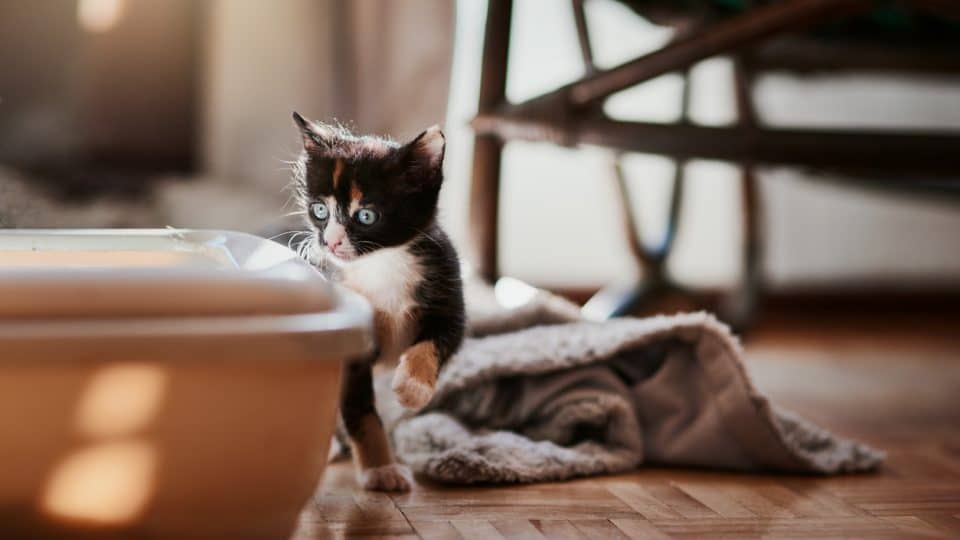Like pooping outside the litter box, your cat peeing where they’re not supposed to can be baffling, frustrating, and worrisome. Inappropriate urination is when your cat partially or completely stops using the litter box to pee. Whether it’s on the bathroom floor, your favourite sweater, or the dog’s bed—rest assured it’s not spiteful behaviour.
Inappropriate urination isn’t uncommon when something is amiss (10% of all cats will do it at some point during their lives). This makes it an important means of communication between you and your kitty. Your cat might be ill, stressed, or affected by something in their environment. Let’s explore the reasons why your cat may be peeing everywhere except their litter box. Some issues might need a simple DIY fix, while others might require a feline behaviourist or your trusted vet.
If your cat is experiencing any pain, loss of appetite, or other changes in behaviour, it’s best to schedule a trip to the vet.
Why Is My Cat Peeing Outside The Litter Box?
“No species on the planet behaves for no reason,” Dr. Susan Friedman, a psychology professor at Utah State University, told Time. Sure, this revelation was sparked by her ill-mannered parrot who had a habitat of biting. But it’s true for your cat, too. Dr. Friedman’s work emphasises getting to the root of what causes unwanted behaviours—without punishment or scolding.
When it comes to inappropriate urination in cats, the behaviour usually points to separation anxiety or stress, an environmental need like an unclean box or dislike of litter type, or a medical condition ranging from a urinary tract infection (UTI) to arthritis.
The list of reasons why your cat is peeing outside the litter box can feel overwhelming. But by taking notes of their behaviours and any changes at home, you can narrow down the possible reasons.
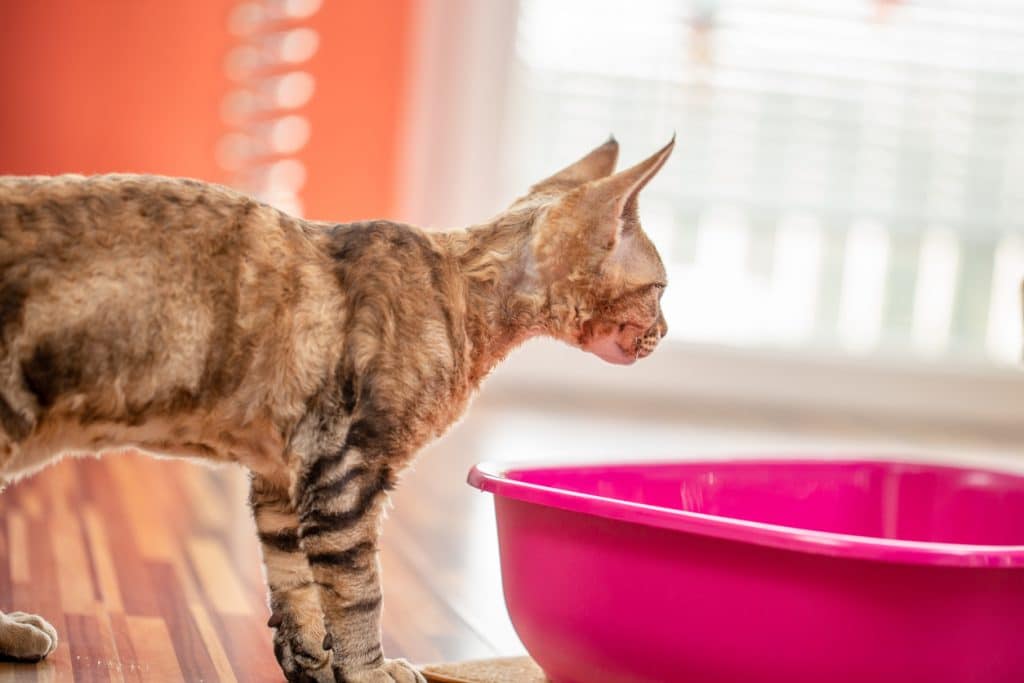
iStock/CasarsaGuru
Medical Problems
If peeing outside the litter box suddenly begins with no other changes at home or is accompanied by loss of appetite, vomiting, or signs of discomfort—a trip to the vet is due.
Your cat might be peeing in your house suddenly if they’re experiencing pain while urinating. They might associate pain with their litter box and seek out other places to pee—especially cool, smooth surfaces like a tile floor or the bathtub. Resolving the medical condition causing the pain and inappropriate urination is the first step, but your cat might need your help in resolving their fears of the box. Here are the most common medical reasons that might cause your cat to suddenly urinate outside of their litter box.
Crystalluria
A high urine pH can lead to the development of crystals in the bladder,” Gina Ushi, DVM, tells The Dog People. Signs of crystal formation include painful urination and urinating small amounts often.
Bladder stones
If your cat has crystals, they can clump together and form stones, Dr. Ushi explains. When this happens, your cat is at risk of a UTI or urinary blockage. Like crystalluria, early signs of stone formation include painful urination and urinating small amounts often. If your cat is experiencing a blockage, the condition becomes very painful, and they won’t be able to pass urine. Urgent vet treatment is needed for a urinary blockage.
UTIs
Changes in bathroom habits like frequent urination, peeing outside of the litter box, or blood in the wee can all be cat UTI symptoms, Dr. Ushi says. But, Blue Pearl Vet adds that you should be careful not to attribute all urinary issues to a UTI, as they’re pretty uncommon in cats under 10.
Feline diabetes
Cats are susceptible to developing diabetes, with type II diabetes being more common among felines. In both types, pet parents typically notice symptoms including weight loss despite a normal appetite, coupled with increased thirst and urination.
Arthritis
Difficulty getting up after resting, soreness after play or the inability to enter the litter box can all be signs of arthritis in cats.
Obesity
If your cat is overweight or obese, they may not be able to enter the litter box and choose to pee elsewhere.
Kidney disease
Three out of 10 geriatric cats (age 15 or older) will receive a diagnosis of chronic kidney disease. Symptoms of kidney disease includes increased thirst, frequent urination (inside or out of the box), normal appetite with weight loss, lack of energy, and poor grooming habits.
Hyperthyroidism
Hyperthyroidism in cats can be hard to spot with symptoms that look a lot like other medical conditions. If your cat is showing unusual behaviours like inappropriate urination, restlessness at night, and a lack of grooming accompanied by unexplained weight loss, ask your vet if hyperthyroidism could be to blame.
Feline lower urinary tract disease
Feline lower urinary tract disease (LUTD) describes abnormalities in the lower urinary tract including the bladder and urethra. It’s a general term versus a specific diagnosis and includes symptoms like peeing outside of the litter box, excess licking of the genital region, and blood in the urine. Infections, inflammation, diet, behavioural changes, or a combination of these things, can cause LUTD.
Feline idiopathic cystitis
You can think of feline idiopathic cystitis (FIC) as a catch-all term for conditions in the bladder, a more specific diagnosis under LUTD. “Idiopathic” literally means the cause of the disease is unknown, while “cystitis” means inflammation of the bladder. Because the cause isn’t well understood, your vet may take a multi-faceted approach to FIC treatment including reduction of stress, change in diet, and medications.
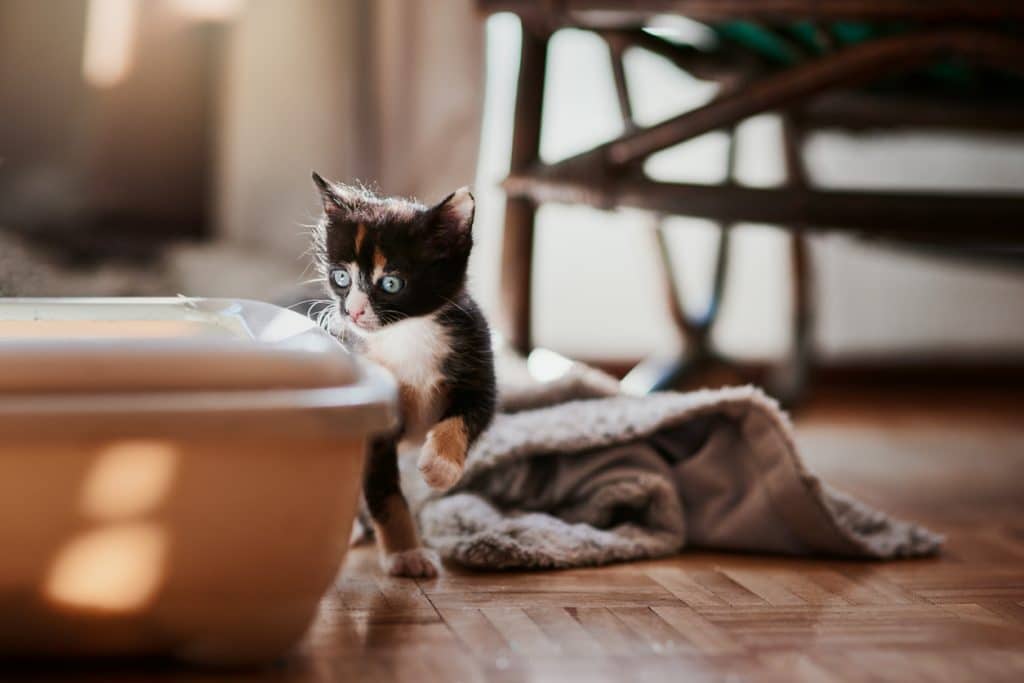
iStock/Adene Sanchez
Behavioural Problems
Whether your cat is dealing with the fear of a litter box after painful urination or another stressor is causing inappropriate toileting, peeing outside the litter box is a surefire sign your cat is seeking your help. Rita Reimers and Linda Hall of Cat Behavior Alliance suggest considering these likely causes of your cat peeing outside the litter box.
Changing litter box location
Litter boxes should be placed in low-traffic areas away from your cat’s food and water. If your home has multiple floors, the experts at Cat Behavior Alliance say to place a box on each one.
Wrong type of litter
Cats may avoid the litter box if it’s harsh on their paws or nose.
Unreachable litter box
Cats with arthritis don’t want to use top entrance litter boxes. If a cat can’t enter a box because it’s painful on their joints or they’re too small to climb in, they’ll find another place to go.
Multiple cats in the home
Multi-cat households can put extra stress on bathroom time, especially if one cat is dominant over the other or there aren’t enough litter boxes for the whole clowder.
Stress
Cats thrive on routine. Any changes like a move or a new family member can cause your cat stress and a change in behaviour—including peeing on the floor.
Separation anxiety
Inappropriate urination is the most common sign of separation anxiety in cats. Some cats experiencing separation anxiety will seek out belongings that smell like their human to do their business on. That’s according to Dr. Mikel Delgado, a cat behaviour consultant and postdoctoral fellow at the School of Veterinary Medicine at the University of California, Davis.
Dirty litter box
“Every litter box should be scooped one to two times a day,” Dr. Delgado says. “Cats are very clean and prefer a box free of ‘obstacles’ such as pee clumps and poop.”
Getting to the root of behavioural issues isn’t always easy and might take some trial and error. Plus, says Dr. Delgado, the unwanted behaviours could be happening while you’re not home. So, consider setting up a pet cam to capture any distress.
Do Cats Pee Out of Spite?
No, cats don’t pee out of spite. “Misbehaviors almost always have a basis in anxiety or a problem in the environment,” Dr. Delgado says. “We don’t know if cats experience emotions like jealousy in the same way we do, but cats can get stressed and anxious, which we might interpret as jealousy or a similar feeling.”
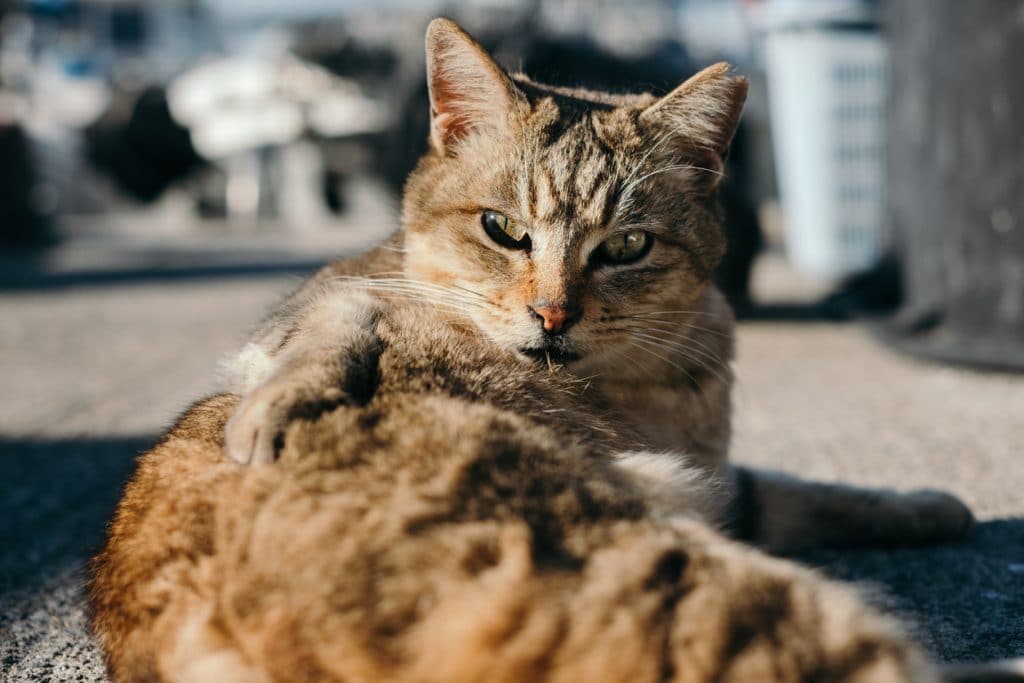
iStock/liebre
How Do I Stop My Cat From Peeing Everywhere?
If your cat is peeing outside of the litter box, schedule a visit with your vet to rule out any underlying health concerns.
You’ll want to clean up the urine right away, too. Areas that smell like your cat’s urine might encourage them to continue to pee in the same place. “You need an effective enzyme cleaner that can remove the odour, not just cover it,” Dr. Delgado says. “My favourite product is Mister Max Anti Icky Poo Unscented.”
If medical conditions are ruled out, then it’s time to make some changes at home:
| Behavioural problem | Possible solution(s) |
| A recent change in litter box location | Using positive association and rewards, encourage your cat to use the litter in the new location. |
| Litter box in the wrong location | Move the litter box to a different location away from high-traffic areas, their food, or water. |
| Dirty litter box | Scoop the litter box at least once a day. Some cats prefer a fresh layer of substrate after scooping. Too busy to scoop? |
| Wrong type of litter | Cats have sensitive noses and toes beans, making coarse, dusty, or scented litters less than desirable. Next time you’re at the store, reach for low-dust, non-scented litters, or litters as close to sand consistency as possible. |
| Unreachable litter box | Move the litter box to a more accessible location, especially if you have senior cats or small kittens. Choose a litter box that is appropriately sized with sides that can be easily stepped over and enough room to squat and turn around in. |
| Multiple cats in the home | Place more litter boxes around your house, including on every floor. A good rule of thumb is one box for every cat plus an extra just in case. If your litter boxes are covered, swap a few for open boxes. |
| Stress | Add plenty of extra playtime, toys, vertical towers, and bonding time to help your cat de-stress. |
| Separation anxiety | Talk with a cat behaviour expert or vet to come up with ways to make your cat feel more secure when you’re away. Solo toys including puzzles or hiring a cat sitter for long days alone could be a solution. |
| Marking territory | Spraying is most common in unneutered male cats, but intact felines of both sexes might also spray. Spraying is different from peeing outside of the litter box—it’s typically done on vertical surfaces while standing (not squatting) and will be a small amount of urine. Neutering your cat or reducing stress will typically stop spraying behaviours. |
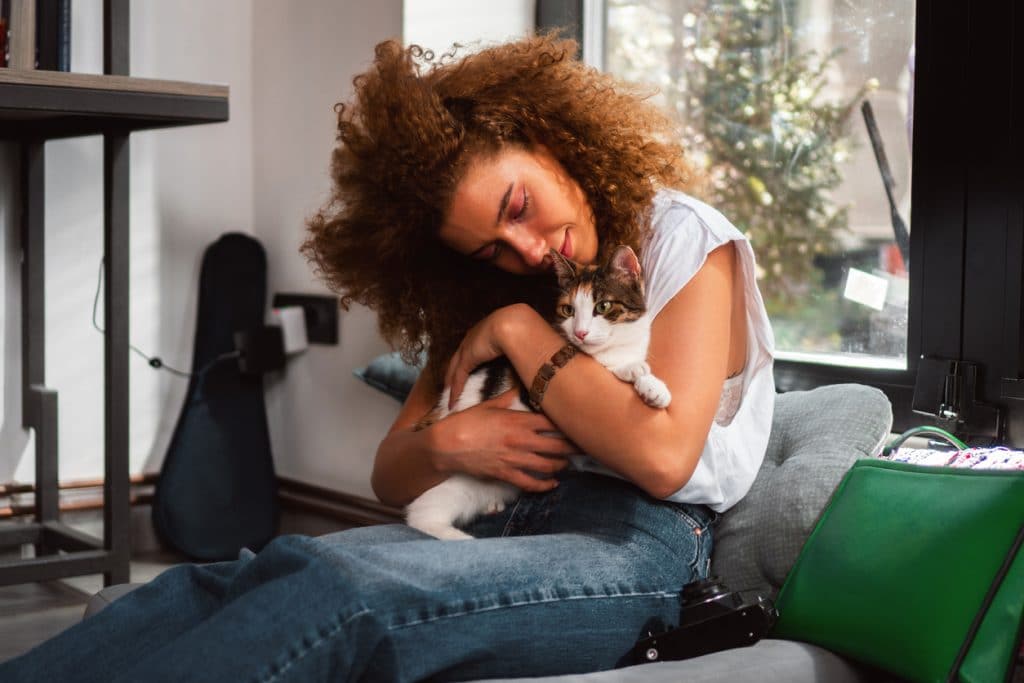
iStock/StockRocket
Takeaway
Peeing outside of the litter box isn’t fun for anyone. If your cat is experiencing bathroom troubles, it’s time for extra love and a trip to the vet. While the situation can be challenging, try your best to reduce extra stress for your feline. Stick to a routine and provide a calm, clean environment.
If your cat is prone to urinary issues that cause inappropriate peeing, get one step ahead of it with a Rover-reviewed pH-changing litter. And ask your vet if urinary supplements can help keep your cat’s pH in a healthy range. If behavioural issues are to blame for your cat suddenly peeing everywhere, we’ve also rounded up the best litter boxes for finicky felines.
With a clean bill of health and a revamped litter box set-up, your cat will be back to snuggling your favourite sweater rather than urinating on it.
